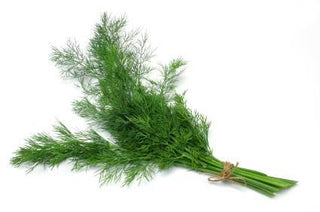(Anethum graveolens)
The word “dill” comes from the Norse “dilla” meaning “to lull”. Dill tea is used to help lull a person to sleep. The dill plant is used primarily in pickling which is explains how the term Dill Pickles came about.
Health Benefits
As a carminative (helps with intestinal gas), dill aids digestion, stimulates the appetite, and settles the stomach. The anti-bacterial properties of dill are associated from the essentials oils from the leaves. Dill inhibits the growth of several bacteria. This effect suggests that it might help prevent gastrointestinal illness-infectious diarrhea caused by these same microorganisms. Dill seeds and leaves are used to freshen the breath and mouth.
Nutritional Value
Dried dill provides is a good source of a broad range of minerals including iron, manganese, calcium, magnesium, and potassium. Fresh dill provides a better source of vitamins A and C.
Recipe Ideas
Dill leaves and seeds are used are used for culinary purposes. With its mild anise flavor, dill can be added to a wide variety of soups, stews and main course dishes. A dash of dill adds flavor to egg salad. Combine 4 tablespoons of low-fat sour cream or low-fat plain yogurt with 2 tablespoons of dried dill. Squeeze half a lime and add a dash of red pepper. Mix and serve over salmon or other grilled fish.
Interesting Facts
Dill is used to stop the hiccups.

